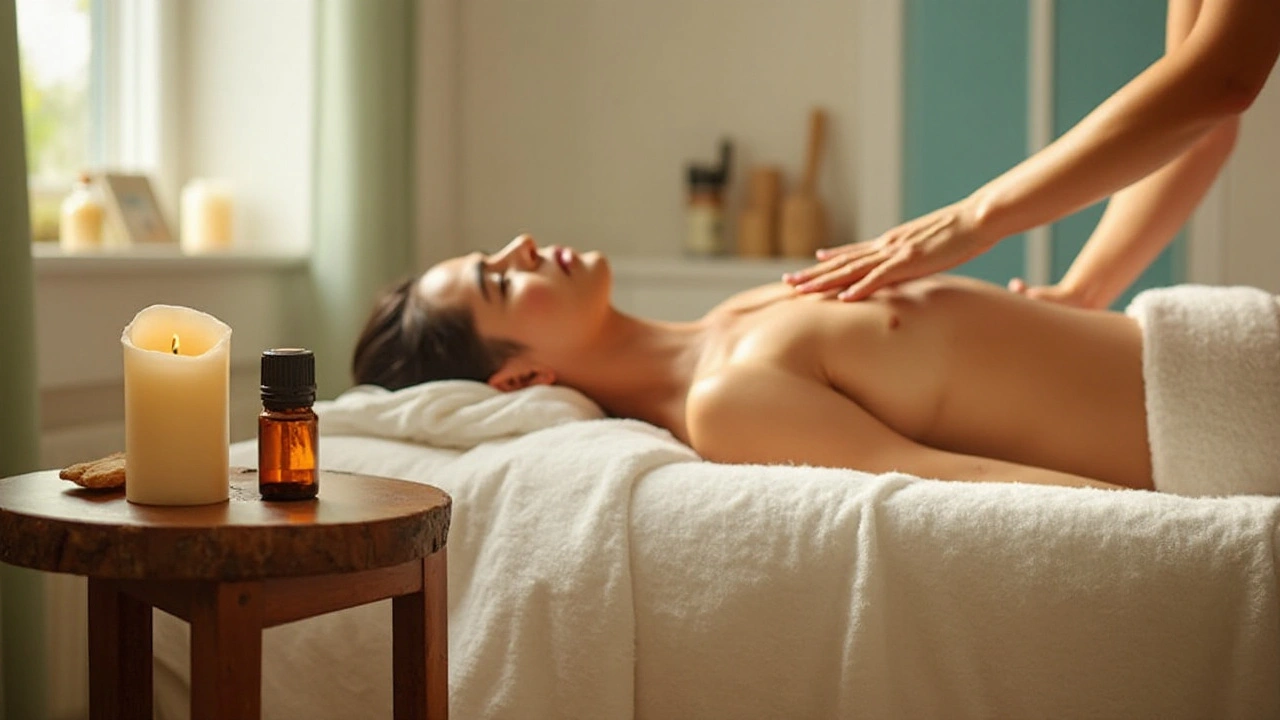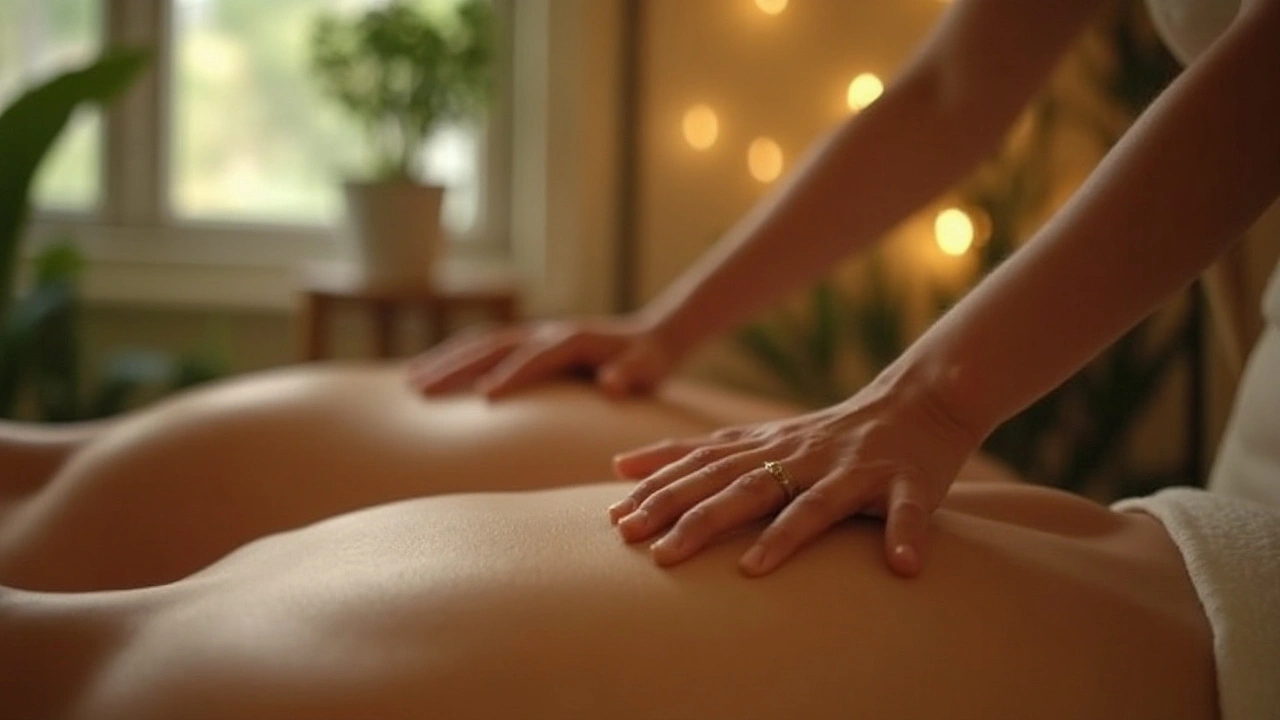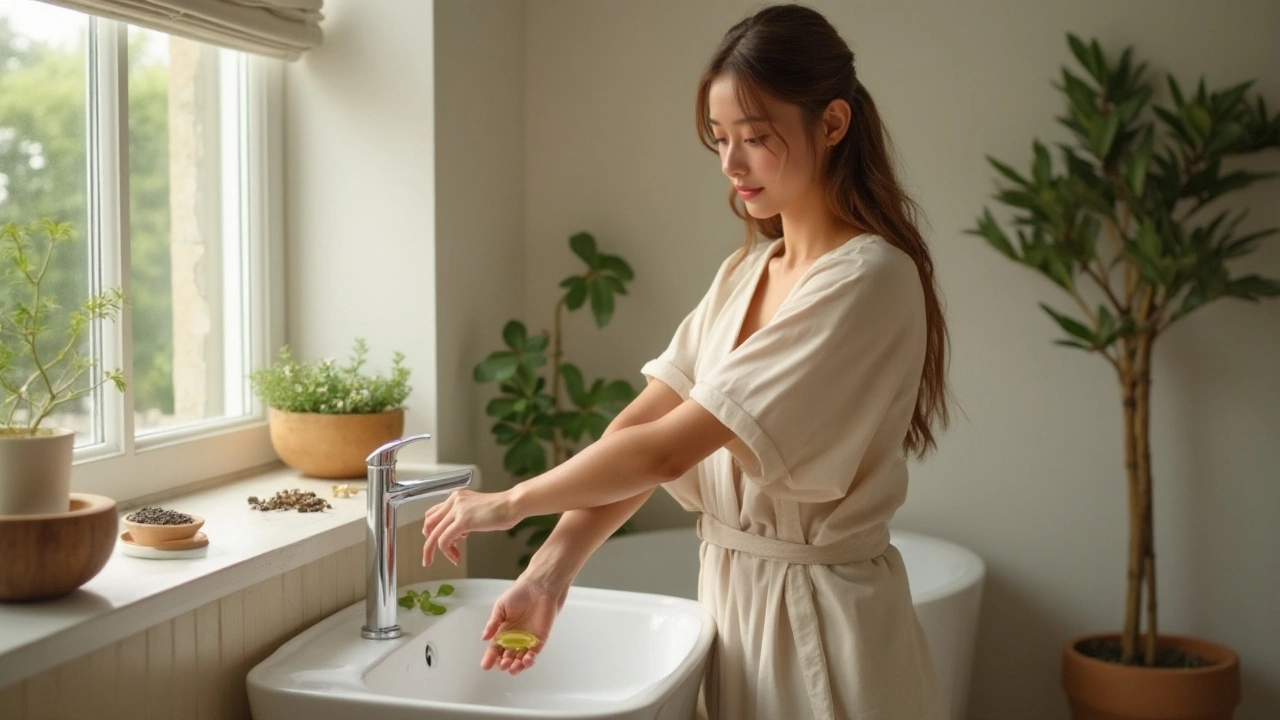10 Hidden Benefits of Abhyanga Oil Massage You Must Know
 Sep, 19 2024
Sep, 19 2024
Have you ever heard about Abhyanga oil massage? This ancient Ayurvedic practice has been around for centuries and promises benefits that go beyond simple relaxation. Today, we dive into how this self-care ritual can enhance your health and well-being in ways you never imagined.
From improving skin health to aiding in better sleep, Abhyanga offers a holistic approach to looking after both your body and mind. This article explores ten hidden perks of incorporating Abhyanga into your daily routine. Let’s get started and uncover what makes this oil massage worth trying.
- What is Abhyanga?
- Enhances Skin Health
- Boosts Circulation and Lymphatic Drainage
- Reduces Stress and Anxiety
- Aids in Better Sleep
What is Abhyanga?
Abhyanga is an ancient Ayurvedic practice that involves the rhythmic application of warm oil to the body. In Ayurveda, the traditional system of medicine that originated in India, Abhyanga is not just a massage but a ritual meant to harmonize the body, mind, and spirit. The word 'Abhyanga' itself is derived from Sanskrit, meaning 'massaging with oil.' This practice is traditionally performed using herbal oils that are customized based on an individual's doshas or body constitution types.
The essence of Abhyanga lies in its specific techniques and oils. These herbalized oils are selected to balance the dominant dosha - Vata, Pitta, or Kapha - in an individual's body. Warm oil is used because it helps to penetrate the skin deeply, providing nourishment and bringing a sense of warmth and calm. The oil is usually infused with various herbs and ingredients like sesame seed, coconut, and mustard, each catering to different skin types and doshas.
Beyond relaxation, Abhyanga aims to detoxify the body by enhancing the flow of lymphatic fluid and aiding in the removal of waste products. It also moisturizes the skin, boosts circulation, and imparts a natural glow. Ayurveda suggests doing Abhyanga daily as part of a dinacharya, or daily routine, to maintain overall health and wellness.
According to Dr. Vasant Lad, a renowned Ayurvedic physician and author,
“Regular practice of Abhyanga nourishes the entire body, decreases the effects of aging, and promotes longevity.”This statement underscores how deeply Abhyanga is rooted in promoting long-term health and vitality.
The practice of Abhyanga is pretty straightforward. You start by slightly warming the oil, making it easy to spread and ensuring that it feels comforting on the skin. Then, you gently massage the oil onto your body, starting from the scalp and moving down to your feet. Circular motions are used over the rounded areas like your head and joints, and straight strokes are applied over long bones like your arms and legs. This rhythmic massage not only relaxes your muscles but also soothes your nervous system, making it a holistic experience.
In today's fast-paced world, incorporating Abhyanga into your daily routine might seem time-consuming, but even dedicating a few minutes can lead to noticeable benefits. It is a great way to wind down and reconnect with your body, offering you a chance to step back from the busyness of life and nurture yourself.
In summary, Abhyanga is more than just an oil massage; it's a holistic ritual that offers a multitude of benefits. This Ayurvedic practice goes beyond the surface level, working on inner health and well-being. Its emphasis on using specific, natural oils tailored to individual body types makes it a personalized experience. With its ancient roots and modern-day relevance, Abhyanga is truly a timeless self-care practice.
Enhances Skin Health
One of the first visible benefits of Abhyanga oil massage is the enhancement of skin health. This Ayurvedic practice involves the application of warm oil, often infused with herbs, which can deeply nourish the skin. The warm oil penetrates into the skin’s layers, leaving it soft, supple, and glowing. When you regularly massage your skin with oil, you help maintain its moisture balance and prevent dryness, especially during harsh weather conditions.
Ever wondered why your skin feels rejuvenated after an oil massage? The answer lies in the natural ingredients used. Oils like sesame, coconut, and almond are rich in vitamins and antioxidants, which are essential for maintaining healthy skin. Vitamin E, found in many of these oils, acts as a powerful antioxidant that helps to repair and protect the skin from damage caused by free radicals. This translates to fewer fine lines, wrinkles, and an overall younger-looking complexion.
Another notable benefit is the exfoliating effect of Abhyanga. As you massage the oil into your skin, you are also aiding in the removal of dead skin cells. This gentle exfoliation process can help to unclog pores, reduce acne, and promote an even skin tone. A simple routine of a few minutes can make a world of difference over time.
According to Dr. Deepak Chopra, a renowned figure in Ayurvedic medicine, “Consistent practice of Abhyanga can lead to noticeable improvements in skin texture and tone. The oils used are absorbed through the skin, reaching the deeper tissues and providing lasting nourishment.”Moreover, Abhyanga supports better blood circulation. Improved circulation means more oxygen and nutrients are delivered to the skin, which helps in the repair and regeneration process. This not only gives your skin a healthy glow but also strengthens your skin’s natural barrier against environmental stressors.
Natural Protection and Healing
In addition to its cosmetic benefits, Abhyanga oil massage has a therapeutic side. The oils used have natural anti-inflammatory and antibacterial properties, making them effective in soothing skin conditions such as eczema, psoriasis, and rashes. The act of massaging itself can reduce inflammation and promote faster healing of minor cuts or abrasions.To get the most out of your Abhyanga routine, choose an oil that suits your skin type. For example, coconut oil is excellent for dry skin, while sesame oil works wonders for all skin types and is particularly beneficial for detoxification. Incorporating herbal oils like neem or tulsi can provide targeted benefits for specific skin concerns.
Incorporating Abhyanga into your daily routine doesn't require a lot of time. A quick 10 to 15-minute session before your bath can significantly improve your skin’s health. You’ll start noticing the difference in just a few weeks, making it an excellent addition to your self-care rituals.

Boosts Circulation and Lymphatic Drainage
One of the most compelling reasons to include an Abhyanga oil massage in your wellness routine is its ability to significantly boost circulation and improve lymphatic drainage. But how does it work? Well, the act of massaging warm oil onto your skin stimulates blood flow to various parts of your body. This increased circulation means more oxygen and nutrients are delivered to your cells, enhancing tissue health and overall vitality.
Moreover, the lymphatic system is crucial for removing toxins and waste from our bodies. Unlike the circulatory system, the lymphatic system doesn’t have its own pump, relying instead on muscle movement and massage to function effectively. Regular Abhyanga massage can help keep this system running efficiently. By applying gentle, rhythmic strokes, you can stimulate lymphatic flow, aiding in detoxification and reducing the risk of infections and diseases.
Research supports these benefits. A study published in the Journal of Clinical and Diagnostic Research found that regular oil massage profoundly impacts the lymphatic system’s effectiveness. The study highlighted that participants who received consistent massages saw improvements in lymphatic flow and toxin removal. As explained by Dr. John Douillard, an Ayurvedic practitioner,
“Abhyanga not only nourishes the skin and calms the nervous system but also enhances blood circulation and lymphatic drainage, keeping your body in tip-top shape.”This makes Abhyanga not just a soothing practice but a scientifically backed method of boosting your health.
In addition to these physical benefits, improved circulation has a positive impact on mental wellness. Better blood flow to the brain means better cognitive function, which translates into sharper memory and improved concentration. So, an Abhyanga massage does much more than pamper your skin; it supports your holistic health by keeping your body’s systems in perfect harmony.
How to maximize these benefits? Aim to perform the massage in the morning. Warm oils like sesame or coconut oil work best. Start massaging from your extremities, moving toward the heart to promote optimal circulation. Don't forget to give special attention to areas like your feet and hands, which often need extra care.
Reduces Stress and Anxiety
Modern life is full of stressors, wearing down both our mental and physical health. Abhyanga, the traditional oil massage from Ayurveda, stands out as a powerful remedy for stress and anxiety. What makes it so effective?
The practice of Abhyanga focuses on the application of warm oil to the body, followed by a thorough massage. This combination isn't just soothing; it's scientifically proven to reduce levels of cortisol, the body's primary stress hormone. When cortisol spikes, it can lead to a host of problems, including poor sleep and weakened immune response. Abhyanga helps bring these levels back to normal, fostering tranquility.
One known benefit of Abhyanga is its calming effect on the nervous system. The tactile stimulation of the skin sends signals to the brain, triggering a relaxation response. This can be particularly beneficial for people dealing with anxiety disorders. Engaging in this self-care ritual regularly can create a sense of grounding and balance.
In the words of Dr. Vasant Lad, a renowned Ayurvedic physician, “Abhyanga nourishes the body, decreases the effects of aging, and provides a deep relaxation to the mind and nervous system.”
Besides direct stress-relief, Abhyanga indirectly supports stress management. Improved blood circulation aids in more efficient delivery of oxygen and nutrients, making you feel naturally rejuvenated. When your physical health is in a better state, the mind often follows suit, creating a virtuous circle of well-being.
Practical tips for doing Abhyanga at home include choosing the right oil—sesame and coconut oils are highly recommended. Heat the oil to a pleasant temperature and apply it generously over your body. Massage in circular motions on joints and long strokes on limbs. Spend at least 15-20 minutes on this ritual for maximum benefits.
Moreover, incorporating Abhyanga into your daily routine can help you maintain a balanced outlook. Performing the massage at the same time every day provides structure and establishes a calming routine. It transforms from merely a physical activity to a sacred time you reserve for self-care and mental peace.
Finally, let’s not forget another key benefit: deep sleep. The relaxation achieved through Abhyanga prepares your body for a restful night. Improved sleep quality is often one of the first changes people notice when they start practicing Abhyanga, making it easier to cope with daily stressors.

Aids in Better Sleep
Getting a good night’s sleep can sometimes feel like chasing a mirage in our fast-paced lives. However, Abhyanga oil massage has long been celebrated in Ayurveda for its role in enhancing sleep quality. How does it work? By utilizing warm, soothing oils such as sesame or coconut, Abhyanga helps to calm the nervous system. This act of massaging your body with oil can significantly reduce the stress hormones, allowing your mind to settle before bedtime.
The rhythm of a slow, deliberate massage has a unique way of signaling the body to relax. The pressure applied during the massage stimulates the production of serotonin, a neurotransmitter that plays a crucial role in mood regulation and sleep cycles. With the gentle yet firm strokes that activate blood circulation, body becomes more at ease, inching you towards that coveted restful state. This increase in serotonin levels can often be enough to transition into a state where falling asleep feels as natural as breathing.
Why is this so effective? Dr. John Douillard, a well-known Ayurvedic practitioner, suggests that
“the rhythmic, steady motion of Abhyanga calms the body and mind, giving you a sense of harmony right before sleep.”When you create a consistent routine of self-massage, your body starts to anticipate the relaxation it associates with sleep, making the transition smoother each night.
Interestingly, research also supports these claims. A study published in the Journal of Alternative and Complementary Medicine found that participants who practiced regular self-massage with oil reported not only an improvement in the quality of their sleep but also a decrease in feelings of fatigue upon waking up. The therapeutic effects of these oils, combined with the act of massaging, set the stage for a tranquil and restful night.
Imagine combining this practice with your other night-time routines. Many find that performing Abhyanga about an hour before they plan to sleep, perhaps after a warm bath, can bring an additional layer of relaxation to their evening rituals. It's like creating a sanctuary for your senses, where the soft glow of the bedside lamp meets the delicate floral scent of the oil, engaging you into a state ready for sleep.